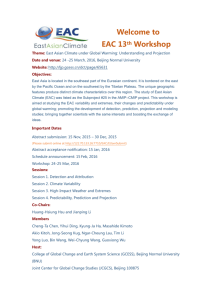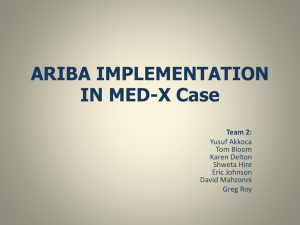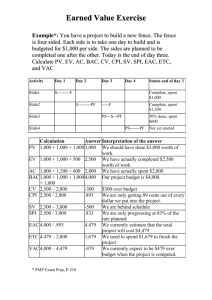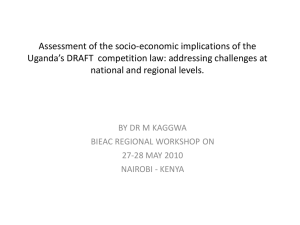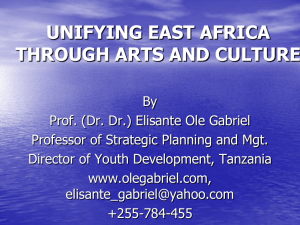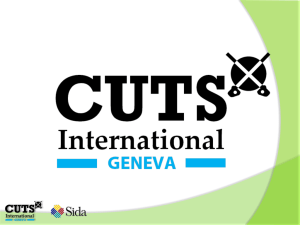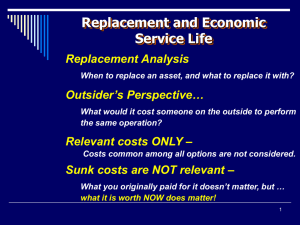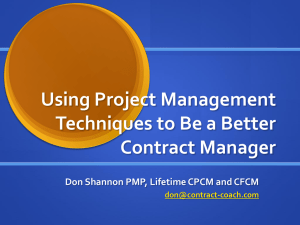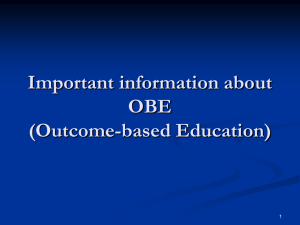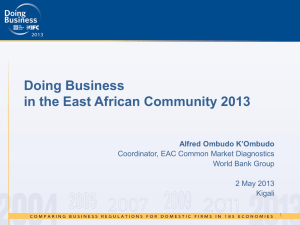will take place in Uganda - Intellectual Property Watch
advertisement
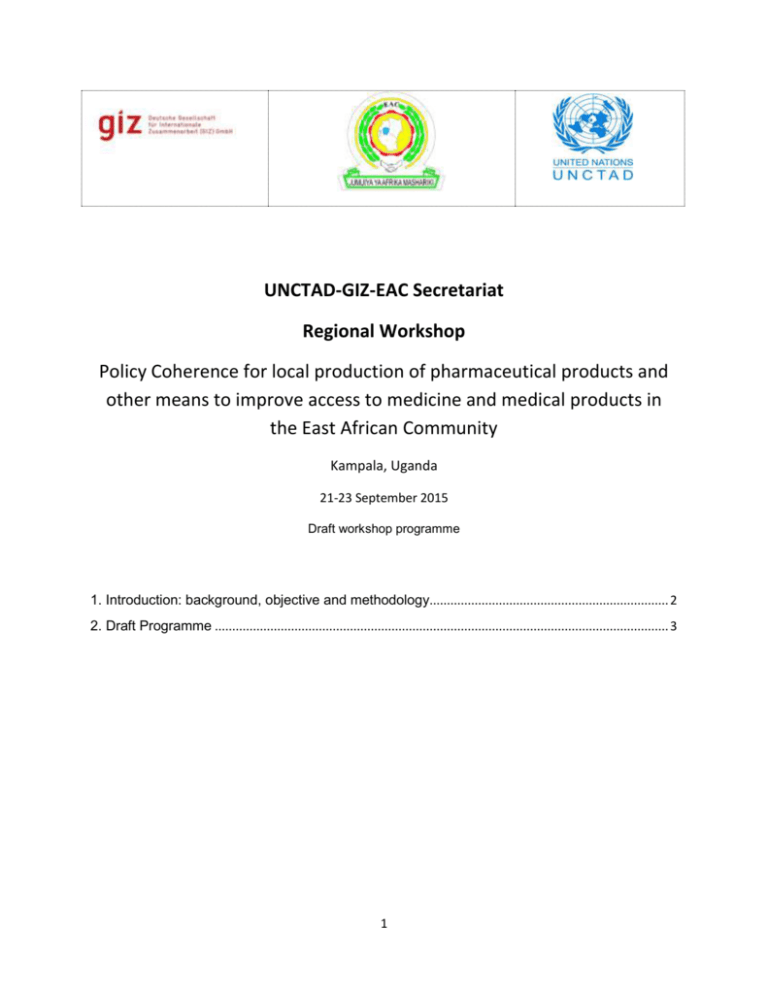
UNCTAD-GIZ-EAC Secretariat Regional Workshop Policy Coherence for local production of pharmaceutical products and other means to improve access to medicine and medical products in the East African Community Kampala, Uganda 21-23 September 2015 Draft workshop programme 1. Introduction: background, objective and methodology..................................................................... 2 2. Draft Programme ................................................................................................................................... 3 1 1. Introduction: background, objective and methodology The United Nations Conference on Trade and Development (UNCTAD), the East African Community (EAC) Secretariat and Deutsche Gesellschaft für Internationale Zusammenarbeit (GIZ) are organising a regional workshop for the promotion of policy coherence for local production of pharmaceutical products and other means to improve access to medicine and medical products in the East African Community. The workshop is intended to facilitate discussion on key features of the industrial, trade and health related initiatives, policies and laws of EAC among policy makers, regulatory agencies, the private sector and civil society. EAC so far has adopted the Regional Pharmaceutical Manufacturing Plan of Action, 2012-2016 and the Regional Intellectual Property Policy on the Utilisation of Public Health-Related WTO-TRIPS Flexibilities and the Approximation of National Intellectual Property Legislation, 2013. Yet many of the key policy and regulatory initiatives of EAC are at the working stage. These include an EAC Anti-Counterfeit Bill (2013) and the proposed African Community Medicines and Food Safety Commission (EACMFSC) Bill, the Medicines Registration Harmonization initiative (launched in 2012) and the procurement of essential medicines and health supplies. Objective The breadth of the current initiatives at the EAC level would have paramount implication for access to medicine and medical products. The objective of the workshop is to enable the identification of gaps and the means to promote policy coherence at the regional level for improved access to medicines, as well as priority action areas for EAC and its partner states. The third day morning session is dedicated for group discussion on each theme of the workshop. Methodology The methodology of the Workshop consists of dedicated discussions on health, industrial, trade, intellectual property and innovation policies involving a presentation of the key issues, commentaries from selected discussants, and open discussions by all participants. Each session will have a facilitator and rapporteur. The regional experts should take a leading role in the discussion. The workshop will also provide for the exchange of experience with the Economic Community of West African States (ECOWAS). International experts will facilitate and provide input based on developments at international level. 2 2. Draft Programme Kampala, Uganda, Venue to be determined 21 September 2015 Opening Session 08:30 – 09:00 09:00 – 09:30 09:30 – 10:00 10:00 – 10:30 10:30 – 10:45 10:45 – 11:30 Welcome Remarks Introductory Session Pharmaceutical Manufacturing for Access to Opening discussion Medical Products: Developing a Multidisciplinary facilitated by Regional Framework to Improve Public Health GIZ/UNCTAD/ Session 1 - The role of Regional Health Policy and Drug regulations Facilitator: Rapporteur: (drug regulatory expert) Overview of EAC health policy development: EAC Secretariat Regional health policy, universal health coverage and health insurance Harmonization of drug regulations; Good Manufacturing Practices Coffee break Comments (maximum- 10mnts each) Views from the private sector on EAC regional health policy initiatives; Experience of the Western African region on regional health policy and drug regulations; Views from the Civil society; Views from partners: 11:30 – 12:30 Open discussion 12:30 – 13:30 Lunch Break 14:00-14:30 UNCTAD GIZ EAC Secretariat FEAPMA representative. West African Health Organisation (WAHO) Center for Health, Human Rights and Development (CEHURD)/or East African Health Platform (EAHP) Representative of GIZ, BMGF, WB, MRH project, and WHO All Participants Session 2 - The Health and Industrial Policy Nexus Facilitator: Rapporteur: (industry expert) Regional Pharmaceutical Manufacturing Plan of EAC Secretariat Action and EAC Industrialisation Policy 14:30 – 15:00 Experience of ECOWAS in regional industrial policy for pharmaceutical production ECOWAS 15:00-15:45 Comment (15mnts each): Views from the private sector; Views from development finance institutions: FEAPM Representative 3 WB-IFC, African Development Bank, EAC Views from National Ministries of Industries Development Bank Representative of one Ministry of Industry, from EAC partner states 15:45 – 16:00 Coffee break 16:00 – 17:00 Open discussion All Participants Reception 22 September 2015 Session 3 - Trade, Procurement and Supply management Facilitator: Rapporteur: (supply management expert – Representative of National Procurement Agency ) 09:00 – 09:30 The state of EAC internal market and common EAC Secretariat external tariff: implications for drug policy 09:30 – 10:00 Comments (15mnts each) FEAPMA representative. Views from the private sector Experience of the Western African Representative of region. ECOWAS 10:00 – 10:30 Questions and Answers All Participants 10:30 – 10:45 Coffee break 10:45 – 11:15 The role of EAC on: EAC Secretariat Harmonisation of procurement practices Regional pooled procurement of pharmaceutical and supply. 11:15 – 11:45 Experience of West African Health Organisation WAHO (WAHO) on procurement for local producers 11:45 – 12:30 Open discussion Lunch Break 12:15 – 13:30 13:30 – 14:00 15:00 – 15:15 Open discussion: Control of trade in Facilitated by UNCTAD Unauthorised/Substandard and fake medicine Session 4 - Science, Technology and Innovation: Foundations for Local Production Facilitator: Rapporteur: (innovation expert) Technology, Innovation and skill development in EAC Secretariat the pharmaceutical sector: the role of regional cooperation Comments (10mints each): Makerere University)/ Inter-University Ermias Biadgleng, Legal Council for East Africa IUCEA) Expert, UNCTAD UNCTAD KEMRI/Uganda Health Research Organization Coffee break 15:15 – 16:00 Open Discussion 14:00 – 14:30 14:30 – 15:00 All Participants 23 September 2015 4 09:00 – 09:30 09:30 – 09:40 Session 5 - The Art of Coordination: Group Discussion Review of discussions UNCTAD Introduction to Group discussion UNCTAD Introduction; Setting up the groups; Selection of group discussion facilitators and rapporteurs. Four groups: Group 1: The role of Regional Health Policy and Drug Regulations (Session 1) Group 2: The Health and Industrial Policy Nexus (Session 2) Group 3: Trade, Procurement and Supply Management (Session 3) Group 4: Science, Technology and Innovation: Foundations for Local Production (Session 4). Each group to address: 1. Key issues for Regional mandate and coordination; 2. Regional-partner state coordination; 3. Expectations from: a. EAC Secretariat and regional bodies; b. Partner states (Industry, trade, health, drug authority, intellectual property, and customs offices); c. Pharmaceutical Manufactures; d. Universities and research centres; e. International partners 09:40 – 12:30 Group discussion (with floating coffee break) 12:30 – 14:00 13:30 – 14:00 14:40 – 15:10 15:10 – 15:25 15:25 – 15:40 Lunch break Preparation of report of discussion Presentation of results of discussion Open discussion Coffee break Workshop Evaluation Forms 15:40 – 15:50 15:50 – 16:20 Presentation of certificate Closing statement 14:00 – 14:40 the group the group Group discussion facilitators and rapporteurs Group rapporteurs UNCTAD/GIZ/ EAC Secretariat UNCTAD/GIZ/ EAC Secretariat UNCTAD; EAC Secretariat GIZ; EAC Secretariat; ECOWAS; Participants. 5
